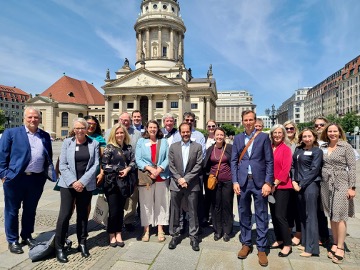8/9/2022 2:53:57 PM
Governmental Affairs Director Darielle Dannen

I recently had the opportunity to participate in this year’s “Berlin Seminar on Energy Policy.” The Seminar, hosted by the German Federal Ministry for Economic Affairs and Climate Action, brings together leading experts from the United States and Germany to discuss best practices and opportunities for clean energy innovation. This year’s Seminar happened at a pivotal time for Germany and the EU. Germany has a new coalition government with ambitious clean energy goals that have butted up against the war in Ukraine and Germany’s reliance on Russian natural gas. In response, Germany is scaling up clean energy initiatives as quickly as they can as they have become increasingly aware of the national security issues that reliance on foreign energy creates.
From a Minnesota Department of Employment and Economic Development (DEED) perspective, there were a number of useful takeaways from learning about Germany’s experiences to consider.
Community Energy Transition
Germany has been working for years on power plant transitions in host communities as clean energy replaces fossil fuels and older infrastructure closes. Those efforts have supported diversifying local economies, provided supports to spur innovation and invested in jobs for the future workforce.
In Minnesota, we have a new Energy Transition Office also focusing on power plant transitions in host communities as energy providers transition to cleaner fuels. Minnesota also has a newly-convened Energy Transition Advisory Committee, tasked with providing recommendations to the Legislature and Governor about how Minnesota should support host communities with a planned plant closures. A report from the Advisory Committee is expected this fall.
Training Programs
Germany has been taking a critical look at the needs of their future workforce and is scaling up training programs to ensure they have the workforce needed to support their ambitious energy transition plans.
In Minnesota, the Legislature and Governor have invested in intentional training programs in clean energy technologies focused on historically disadvantaged communities. Trade unions, technical schools, community colleges, colleges and universities in Minnesota have also been updating their training programs in response to increased demand for weatherization and clean energy technologies.
This fall, the Minnesota Business Vitality Council, a cross-agency working group, intends to release a report identifying any gaps in job training programs for the clean energy sector and making recommendations about additional updates and investments the state and partners should consider to prepare the state’s workforce for future employment opportunities.
Innovation Incentives
The German government has played an important role in piloting promising new clean energy technologies as well as making investments in scaling those technologies. We heard about investments in new clean energy developments, techniques around weatherization and support for local clean energy, as just a few examples.
In Minnesota, a number of state agencies, energy providers and the Minnesota Public Utilities Commission have similarly supported innovative clean energy projects and pilots that are key to the state meeting its climate goals, including investments in more efficient, flexible electric systems and wind, solar and energy storage.
Our teams at DEED are going to connect with leaders in this space to discuss how the agency can play a role in incentivizing innovation around energy transition.
economy
Economic Development